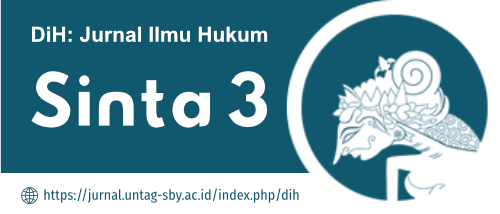REGULASI PELAKSANAAN PENGAWASAN DAN PENINDAKAN KEIMIGRASIAN TERHADAP TINDAK PIDANA PERDAGANGAN ORANG PADA MASA PANDEMI COVID-19
Abstract
This study aims to see how immigrant offices and law enforcement agencies prevent trafficking or human exploitation, especially when the focus of the government and other regulatory agencies is divided between the economy, health, or welfare of its people. This study uses descriptive qualitative research methods. The data used are primary data and secondary data. primary data is the main data obtained from news while secondary data is in the form of supporting information to explain primary data. Data collection is done by collecting as much data as possible related to immigrants and human trafficking. Finally, the presentation of the data is done in the form of paragraphs. The results of this study are that human trafficking actually takes advantage of this pandemic moment very well where they easily adapt, namely by exploiting children or parents through internet media. The authorities and immigration are very divided in their focus regarding the sale and exploitation of humans, including by keeping the port section more stringent because of the frequent interactions of human trafficking through seaports, and also they monitor the movement of the internet and illegal websites that are present in order to minimize sales and exploitation. children or adolescents and adults.
Keywords: Covid-19 pandemic; human exploitation; human trafficking
Abstrak
Penelitian ini bertujuan untuk melihat bagaimana kantor imigran dan badan penegakan hukum mencegah adanya perdagangan ataupun eksploitasi manusia, khususnya ketika fokus pemerintah dan kelembagaan berwajib lainnya terbagi anatar perkeonomian, kesehatan, atau kesejahteraan rakyatnya. Penelitian ini menggunakan metode penelitian kualitatif deskriptif. Data yang digunakan adalah data primer dan data sekunder. data primer merupakan data utama yang didapatkan dari berita sementara data sekunder berupa informasi pendukung untuk menjelaskan data primer. Pengumpulan data dilakukan dengan mengumpulkan sebanyak-banyaknya data yang berkaitan dengan imigran dan human trafficking. Terakhir, penyajian data dilakukan dalam bentuk paragraf. Hasil dari penelitian ini ialah bahwa human trafficking justru memanfaatkan momen pandemi ini dengan sangat baik dimana mereka dengan mudah beradaptasi yakni dengan melakukan pengeksploitasian anak atau orang tua melalui media internet. Pihak berwajib dan imigrasi sangat membagi fokus mereka terkait penjualan dan pengeksploitasian manusia ini diantaranya ialah dengan menjaga bagian pelabuhan dnegan lebih ketat karena seringnya human trafficking berinteraksi melalui pelabuhan laut, dan juga mereka memantau pergerakan internet dan website-website ilegal yang hadir demi meminimalisir penjualan dan pengeksploitasian anak atau remaja dan orang dewasa.
Kata kunci: pandemi Covid-19; pengeksploitasian manusia; penjualan manusia
Downloads
References
Andrees, B. (2014). Kerja Paksa dan Perdagangan Manusia. In International Labour Organization. http://www.ilo.org/wcmsp5/groups/public/---asia/---ro-bangkok/---ilo-jakarta/documents/publication/wcms_335667.pdf
Aquarini, A. (2020). Pengaruh Kebijakan Politik Terhadap Kepatuhan Physical Distancing Mencegah Penyebaran Covid-19. Anterior Jurnal, 19(2), 66–73. https://doi.org/10.33084/anterior.v19i2.1498
Cahyono, A. S. (2016). Pengaruh media sosial terhadap perubahan sosial masyarakat di Indonesia. Jurnal Ilmu Sosial & Ilmu Politik Diterbitkan Oleh Fakultas Ilmu Sosial & Politik, Universitas Tulungagung, 9(1), 140–157. http://www.jurnal-unita.org/index.php/publiciana/article/download/79/73
CNN Indonesia. (2020, April 8). ILO: 2,7 Miliar Pekerja di Dunia Terdampak Virus Corona. CNN Indonesia. https://www.cnnindonesia.com/ekonomi/20200408154246-532-491693/ilo-27-miliar-pekerja-di-dunia-terdampak-virus-corona
Daniah, R., & Apriani, F. (2017). KEBIJAKAN NASIONAL ANTI- TRAFFICKING DALAM MIGRASI INTERNASIONAL National Anti-Trafficking Policies in International Migration Rahmah Daniah dan Fajar Apriani perdagangan manusia ( human trafficking ) masalah migrasi internasional , yang merupakan dalam i. POlitica, 8(2), 137–162.
Díaz, F. (2021). New normal. In Arq (Vol. 2021, Issue 107). https://doi.org/10.4067/S0717-69962021000100010
ILO. (2013). Mencegah Diskriminasi, Eksploitasi Dan Perlakuan Sewenang-Wenang Terhadap Pekerja Migran Perempuan. In Journal of Chemical Information and Modeling (Vol. 53, Issue 9).
Kemenppa. (2020). Pencegahan dan Penanganan Tindak Pidana Perdagangan Orang. Kemenppa. https://www.kemenpppa.go.id/lib/uploads/list/f3b9b-buku-laptah-2018.pdf
Napitupulu, E. A. T. (2020). Dampak Pandemi Covid-19 terhadap Hak-Hak Pekerja: Sebuah Panduan Akses terhadap Keadilan. Institute for Criminal Justice Reform (ICJR). https://icjr.or.id/wp-content/uploads/2021/03/DAMPAK-PANDEMI-COVID-19-TERHADAP-HAK-HAK-PEKERJA.pdf
National Fair Housing Alliance. (2020). FAIR HOUSING IN JEOPARDY : National Fair Housing Alliance. https://nationalfairhousing.org/wp-content/uploads/2020/09/NFHA-2020-Fair-Housing-Trends-Report.pdf
Nizmi, Y. E. (2017). Memahami Problematika Dua Kejahatan Transnasional: Perdagangan dan Penyelundupan Orang di China. Jurnal Global & Strategis, 10(2), 168. https://doi.org/10.20473/jgs.10.2.2016.168-185
Sudiar, S. (2018). Pendekatan Human Security dalam Studi Perbatasan Negara. Jurnal Hubungan Internasional, 7(2). https://doi.org/10.18196/hi.72139
Sultan, J., No, H., Baru, K., & Indonesia, J. S. (2020). MUTUAL LEGAL ASSISTANCE DALAM PENYIDIKAN TINDAK PIDANA PERDAGANGAN MANUSIA MELALUI MEDIA SOSIAL MUTUAL LEGAL ASSISTANCE IN THE INVESTIGATION OF THE CRIMINAL ACTION OF HUMAN TRADE THROUGH SOCIAL MEDIA AS A TRANSNATIONAL ORGANIZED CRIME Shidqi Noer Salsa Ke. 978–979.
Suryani, N. L. (2020). Covid 19 And New Normal. In Desanta Muliavisitama (Issue L). UNPAM Press. http://eprints.unpam.ac.id/8681/2/Covid 19 %26 New Norma %28L%29.pdf
Susanto, M., & Asmara, T. T. P. (2020). EKONOMI VERSUS HAK ASASI MANUSIA DALAM PENANGANAN COVID-19: DIKOTOMI ATAU HARMONISASI (The Economy versus Human Rights In …. Researchgate.Net, 11(2), 301–307. https://www.researchgate.net/profile/Teguh_Asmara/publication/344124259_EKONOMI_VERSUS_HAK_ASASI_MANUSIA_DALAM_PENANGANAN_COVID-19_DIKOTOMI_ATAU_HARMONISASI_The_Economy_versus_Human_Rights_In_Handling_Covid-19_Dichotomy_or_Harmonization/links/5f536187299b
Syamsuddin. (2020). Bentuk-Bentuk Perdagangan Manusia Dan Masalah Psikososial Korban Forms of Human Trafficking and Psychosocial Problems of Victim. Sosio Informa, 6(1), 16–35. https://ejournal.kemsos.go.id/index.php/Sosioinforma/article/view/1928/1155
Utami, P. N. (2019). Penanganan Kasus Tindak Pidana Perdagangan Orang oleh Pemerintah Provinsi Nusa Tenggara Timur. Jurnal HAM, 10(2), 195. https://doi.org/10.30641/ham.2019.10.195-216
Widiastuti, T. W. (2010). Upaya Pencegahan Tindak Pidana Perdagangan Orang (Trafficking). Wacana Hukum, 9(1), 107–120. https://ejurnal.unisri.ac.id/index.php/Wacana/article/view/308/270
Authors who publish with DiH: Jurnal Ilmu Hukum agree to the following terms:
- Authors transfer the copyright and grant the journal right of first publication with the work simultaneously licensed under a CC BY-SA 4.0 that allows others to share the work with an acknowledgement of the work's authorship and initial publication in this journal.
- Authors are able to enter into separate, additional contractual arrangements for the non-exclusive distribution of the journal's published version of the work (e.g., post it to an institutional repository or publish it in a book), with an acknowledgement of its initial publication in this journal.
- Authors are permitted and encouraged to post their work online (e.g., in institutional repositories or on their website) prior to and during the submission process, as it can lead to productive exchanges, as well as earlier and greater citation of published work (See The Effect of Open Access)






